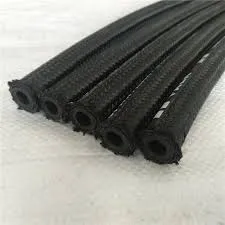Nov . 12, 2024 00:55 Back to list
oem rubber hose
The Importance of OEM Rubber Hoses in Industrial Applications
In the ever-evolving landscape of industrial manufacturing, the term OEM—original equipment manufacturer—holds significant weight. When it comes to components like rubber hoses, the value of OEM products cannot be overstated. OEM rubber hoses are specifically designed and manufactured to meet the exact specifications, performance requirements, and quality standards set by equipment manufacturers. This article explores the critical role of OEM rubber hoses in various applications, their advantages over non-OEM counterparts, and why choosing them is crucial for efficiency and safety.
Understanding OEM Rubber Hoses
OEM rubber hoses are specifically engineered to fit the unique configurations of machinery and equipment created by manufacturers. Unlike generic or aftermarket hoses, OEM options ensure compatibility and reliability. They are designed to meet specific pressure ratings, temperature tolerances, and chemical resistance, making them ideal for a variety of applications in industries such as automotive, aerospace, agriculture, and manufacturing.
The Advantages of Using OEM Rubber Hoses
1. Quality Assurance OEM rubber hoses undergo rigorous testing to ensure they meet the stringent standards set by manufacturers. This testing results in products that consistently perform well under a variety of conditions. By opting for OEM hoses, businesses can minimize the risk of equipment failure due to subpar componentry.
2. Enhanced Durability One of the primary benefits of OEM rubber hoses is their durability. These hoses are crafted from high-quality materials designed to withstand harsh environments, extreme temperatures, and various chemicals. This durability translates to fewer replacements and maintenance efforts over time, leading to cost savings and reduced downtime.
3. Perfect Fit The design of OEM hoses is tailored to fit specific machinery perfectly. This precise fit ensures that hoses can handle the specific flow rates and pressure requirements of the system. Unlike generic hoses, which may not align correctly or create leaks, OEM hoses provide a secure and leak-free connection.
oem rubber hose

4. Improved Performance The use of OEM rubber hoses can lead to enhanced operational efficiency. Because these hoses are designed to the exact specifications of the equipment, they facilitate optimal fluid transfer, minimizing energy loss and improving overall functionality.
5. Compliance and Safety Many industries are governed by strict regulations regarding equipment safety and performance. Using OEM parts ensures compliance with these regulations, reducing the risk of safety violations and potential liability.
Application in Various Industries
OEM rubber hoses find applications across numerous industries. In the automotive sector, they are essential for fuel delivery, coolant systems, and brake lines. Their reliability and performance ensure the safety and efficiency of vehicles. In the aerospace industry, OEM hoses are used in hydraulic systems and fuel lines, where precision and safety are paramount.
In agricultural equipment, OEM rubber hoses facilitate the proper functioning of irrigation systems and machinery, ensuring efficient water and fluid transfer. In manufacturing, these hoses play a vital role in various production processes, including material handling and waste management. The versatility of OEM hoses makes them indispensable in many different scenarios.
Conclusion
In conclusion, opting for OEM rubber hoses is a strategic choice for businesses looking to enhance the reliability and efficiency of their equipment. The quality assurance, durability, perfect fit, improved performance, and compliance associated with OEM products provide substantial benefits that can lead to long-term cost savings and increased productivity. As industries continue to face challenges posed by technological advancements and heightened safety regulations, the significance of high-quality components like OEM rubber hoses will only grow. Investing in these specialized hoses is not just about compliance; it’s about ensuring operational excellence in every aspect. The future of industrial applications hinges on such reliable components, underscoring the importance of OEM solutions in today's manufacturing landscape.
-
Best Four Steel Wire Spiral Hose Hydraulic R12 – Durable High-Pressure Hose Manufacturer
NewsJul.08,2025
-
High-Quality 1/4 Hydraulic Hose – Soft, Flexible & Durable Rubber Hoses for Industrial Use
NewsJul.08,2025
-
1 1 2 Inch Hydraulic Flexible Hose - Durable, Reliable, High-Pressure Solutions
NewsJul.07,2025
-
High-Quality 1 2 Rubber Hose - Durable, Flexible Hydraulic Solutions
NewsJul.07,2025
-
Discover SAE Hydraulic Hose Types - High Quality & Durable Hoses from Leading Factory Supplier
NewsJul.06,2025
-
High Pressure Wire Hydraulic Rubber Hose Supplier Durable & Reliable 1SN Hose Solutions
NewsJul.06,2025
